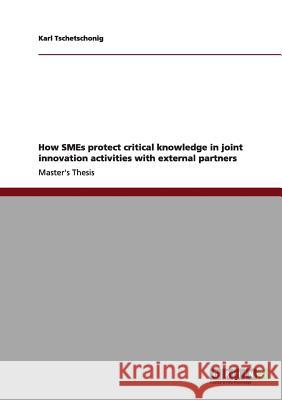How SMEs protect critical knowledge in joint innovation activities with external partners » książka
How SMEs protect critical knowledge in joint innovation activities with external partners
ISBN-13: 9783656099017 / Angielski / Miękka / 2012 / 108 str.
Master's Thesis from the year 2011 in the subject Business economics - Business Management, Corporate Governance, grade: Sehr gut, Vienna University of Economics and Business (Entrepreneurship & Innovation), language: English, abstract: For small firms, knowledge leakage, loss and theft are counted among the greatest risks in inter-firm collaborations. SMEs are more vulnerable, because they suffer from a number of structural disadvantages when collaborating with larger companies, and yet, they need to collaborate with external partners to overcome their lack of resources. Therefore, this study investigates how SMEs can most effectively protect critical knowledge in collaborations with external partners, for that they can prevent knowledge loss, leakage and theft, while maximizing the performance of the collaboration. Based on a comprehensive review of existing literature, and a qualitative multiple-case study evaluation, where highly innovative and successful SMEs in Germany contributed their experiences, I have derived valuable insights for practice and theory. Overall, the most commonly used means of protecting critical knowledge were secrecy, patents, the systematic selection of partners, and contracts. Despite the importance given to these mechanisms, not all of them proved to be effective. In fact, trust, secrecy and the systematic selection of partners were considered to be most effective, while initial secrecy and patents were concluded to overprotect knowledge, thus, limiting the possible overall innovative performance. Complementary assets, rotating personnel, oligopolistic market structures, equity relationships, technical means of protection, and employee contracts were found to be entirely ineffective for SMEs. When analyzing the relations of protection mechanisms, a significant correlation between the type of protection and the openness to external innovation emerged: companies, which used initial secrecy and patents to protect knowledge, did











